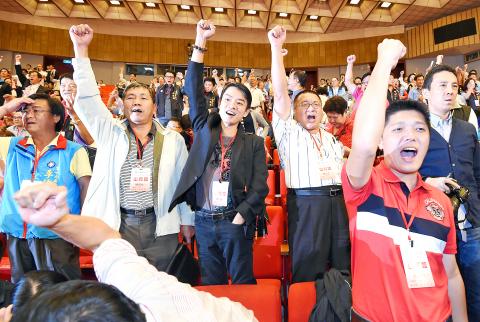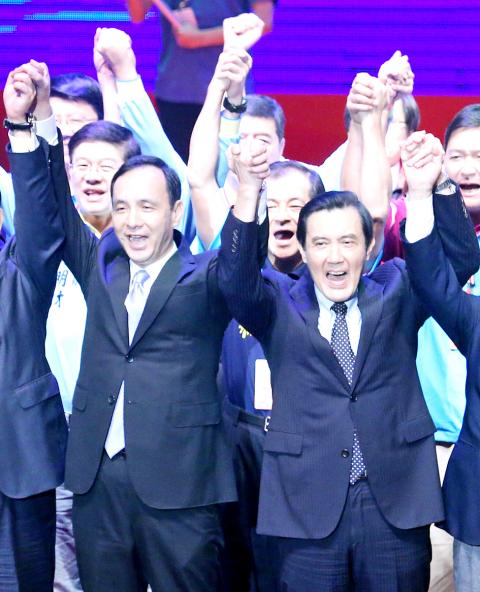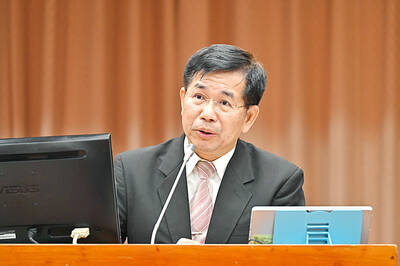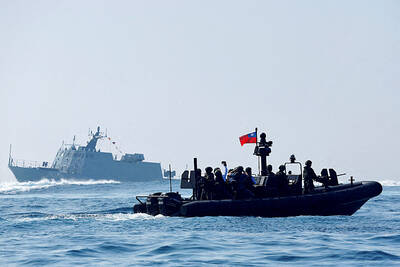Chinese Nationalist Party (KMT) Chairman Eric Chu (朱立倫) yesterday apologized to New Taipei City residents for breaking his promise to serve out his term as the municipality’s mayor after being endorsed by a KMT extempore congress to replace Deputy Legislative Speaker Hung Hsiu-chu (洪秀柱) as the party’s presidential candidate.
Following a landslide vote to rescind Hung’s candidacy, a majority of the 891 KMT representatives at the congress approved Chu’s nomination by standing up and applauding.
The congress authorized Chu to recommend a possible vice presidential candidate, whose nomination is then to be assessed by the party’s seven-person presidential nomination evaluation panel headed by KMT Vice Chairman Hau Lung-bin (郝龍斌).

Photo: CNA
Against the backdrop of party representatives chanting: “Eric Chu, winning the election” and “Go KMT,” Chu said it was with a solemn and heavy heart that he shouldered the expectations the public had for the party.
“Starting today [yesterday], we will adjust our pace and start afresh,” Chu said. “This critical moment might go down in history as a day of polarization for the KMT, but it could also be a time of solidarity.”
Chu said the reason he dared to accept the challenge in the KMT’s darkest hour was the same reason that prompted him to enter politics 17 years ago: to ensure a better world for future generations.

Photo: CNA
Chu said he had been reluctant to consider joining the Jan. 16 race because of the pledge he made to New Taipei City residents when he announced he would run for re-election as mayor in June last year and vowed to serve out a second term.
“Nevertheless, to safeguard the KMT’s reins of government and majority in the legislature, as well as the future of the public and the Republic of China [ROC] ... I must apologize to each New Taipei City resident who supports me,” Chu said.
“I want to tell every Taiwanese and resident of the city that I am doing this because I have to protect the ROC we love, the democratic politics we have fought to preserve and our healthy democracy of checks and balances,” he said.
Should the KMT become a minority party in the legislature or gain less than one-third of the legislative seats in the Jan. 16 elections — to be held alongside the presidential vote — no one can imagine what the Democratic Progressive Party (DPP) might do, Chu said.
Chu said that if the KMT fails to maintain its legislative majority, the nation’s future, as well as cross-strait peace could be jeopardized.
Challenging DPP presidential candidate Tsai Ing-wen (蔡英文) to a debate on cross-strait policies, Chu said Tsai should define the “status quo” she intended to maintain.
“Does her ‘status quo’ refer to the situation maintained by the KMT based on the [so-called] ‘1992 consensus’ or the one championed by President Ma Ying-jeou (馬英九) in accordance with his ‘three noes’ policy — no unification, no independence and no use of force,” Chu asked.
The “1992 consensus,” a term former Mainland Affairs Council chairman Su Chi (蘇起) admitted making up in 2000, refers to a tacit understanding between the KMT and the Chinese government that both sides acknowledge there is “one China,” with each side having its own interpretation of what “China” means.
Chu said he would push for the reinstatement of the legislature’s power to approve the premier appointed by the president as part of the KMT’s effort to promote a Cabinet system of government.
He also vowed to deliver a national report to the legislature each year.

The International Industrial Talents Education Special (INTENSE) Program to attract foreigners to study and work in Taiwan will provide scholarships and a living allowance of up to NT$440,000 per person for two years beginning in August, Minister of Education Pan Wen-chung (潘文忠) told a meeting of the legislature’s Education and Culture Committee yesterday. Pan was giving an update on the program’s implementation, a review of universities’ efforts to recruit international students and promotion of the Taiwan Huayu Bilingual Exchanges of Selected Talent (BEST) program. Each INTENSE Program student would be awarded a scholarship of up to NT$100,000 per year for up to

BASIC OPERATIONS: About half a dozen navy ships from both countries took part in the days-long exercise based on the Code for Unplanned Encounters at Sea An unpublicized joint military exercise between Taiwan and the US in the Pacific Ocean last month was carried out in accordance with an international code, the Ministry of National Defense (MND) said yesterday. According to a Reuters report citing four unnamed sources, the two nations’ navies last month conducted joint drills in the Western Pacific. The drills were not made public at the time, but “about half-a-dozen navy ships from both sides, including frigates and supply and support vessels, participated in the days-long exercises,” Reuters reported, citing the sources. The drills were designed to practice “basic” operations such as communications, refueling and resupplies,

‘MONEY PIT’: The KMT’s more than NT$2 trillion infrastructure project proposals for eastern Taiwan lack professional input and financial transparency, the DPP said The Democratic Progressive Party (DPP) caucus yesterday said it would ask the Executive Yuan to raise a motion to oppose the Chinese Nationalist Party (KMT) caucus’ infrastructure proposals and prepare to file for a constitutional interpretation if the KMT-dominated legislature forces their passage. The DPP caucus described the three infrastructure plans for transportation links to eastern Taiwan proposed by the KMT as “three money pit projects” that would cost more than NT$2 trillion (US$61.72 billion). It would ask the Executive Yuan to oppose public projects that would drain state financial resources, DPP caucus secretary-general Rosalia Wu (吳思瑤) said. It would also file for

SELF-SUFFICIENCY: The project would only be the beginning, as Taiwan needs at least 120 satellites to ensure uninterrupted communication, Wu Tsung-tsong said The Taiwan Space Agency (TASA) yesterday said it plans to launch six low Earth orbit satellites starting in 2026 as part of the government’s plan to boost the resilience of the nation’s communications. The development of the technology gained attention after Ukrainians were able to access the Internet through Space Exploration Technologies Corp (SpaceX) CEO Elon Musk’s Starlink satellite service, despite their infrastructure being severely damaged in the war with Russia. Two of the satellites would be built by the government, while four would involve cooperation between TASA and private contractors. “Over the past 30 years, the satellite technology in Taiwan has